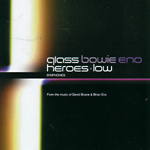Philip Glass’ 1992 Low Symphony is based on an album of the same name by David Bowie and Brian Eno. Taking thematic material from the album’s instrumental portions as a starting point, Glass fashioned three movements that roughly correspond to the outlines of a symphony. It’s not necessary to be acquainted with the original rock album to appreciate Glass’ work (any more than you need to know the Domenico Gallo trio sonatas Stravinsky used in his Pulcinella). However, those familiar with the composer will notice an unusual harmonic and melodic richness, with fully drawn out themes and not just arpeggiated chords, with enough variation to hold the attention.
The first movement (“Subterraneans”) opens in an atmosphere that, with its lofty string suspensions over oscillating woodwinds, sounds curiously like the slow movement of John Adams’ recent Naïve and Sentimental Music. The music gradually builds, increasing rhythmic energy until its dramatic (though somewhat anticlimactic) close. The second movement (“Some Are”) features the more usual Glass rhythmic figurations (including a couple of sequences that nearly outstay their welcome), but the ruminative finale (“Warszawa”) impresses with its clever amalgamation of the Bowie/Eno melodies and the composer’s own style. Dennis Russell Davies leads a well executed and quite convincing performance with the Brooklyn Philharmonic.
The Heroes Symphony, also based on Bowie and Eno tunes, returns to familiar Glass territory. Here the composer fully utilizes his trademark modulations, syncopated rhythms, orchestration, and of course, those endless arpeggios. Unlike the Low Symphony, Heroes started out as a ballet score, which explains why its six movements make no pretense toward symphonic development, sounding instead like a suite of dances. The American Composers Orchestra players manage to maintain energy and a certain degree of freshness despite the challenge posed by the music’s repetitive nature.
The recordings, with their tendency toward brightness and their rather reverberant acoustic, sound about on par with modern movie soundtrack productions. Previously released as two full-price discs, this bargain package will be a treat for Glass fans. If you already know you don’t like Glass, this set won’t change your mind.
































